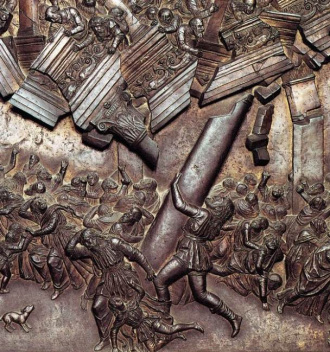Meaning of Numbers: The Number 149
The English phrase "hundred and forty and nine," used for the number 149, is not recorded in the King James Bible.
The possible meaning of the number 149 is derived from the occurrences of certain words in the Bible's original languages and in the King James translation.
The English word "flesh" appears 420 times, in 369 verses, in the King James Bible. It is recorded the most in the book of Leviticus (59 times) followed by Genesis (28) then the book of Romans (26).
The word "flesh" appears in the New Testament 149 out of its 369 appearances. Its first use in this section of Scripture involves Jesus telling Peter that his understanding about the Messiah came directly from God the Father.
And Jesus answered and said unto him, Blessed art thou, Simon Barjona (Peter): for flesh and blood hath not revealed it unto thee, but my Father which is in heaven (Matthew 16:17, KJV).
And the ten horns which thou sawest upon the beast, these shall hate the whore, and shall make her desolate and naked, and shall eat her flesh, and burn her with fire (Revelation 17;16, KJV).
Appearances of Number One Hundred Forty Nine
The Hebrew word chokmah (Strong's Concordance #H2451) is recorded 149 times in the Old Testament's original language. It is used the most in the book of Proverbs (39 times) followed by Ecclesiastes (28).
The word chokmah means "wisdom" or refers to someone who is prudent in their personal or public affairs. It can also reference someone who is skillful at warfare.
And Joshua the son of Nun was full of the spirit of wisdom (chokmah); for Moses had laid his hands upon him: and the children of Israel hearkened unto him . . . (Deuteronomy 34:9, KJV).
The fear of the Lord is the beginning of knowledge: but fools despise wisdom (chokmah) and instruction (Proverbs 1:7, KJV).
The Greek word prophetes (Strong's #G4396) occurs 149 in the Greek version of the New Testament. It is written the most in the gospel of Matthew (39 times) followed by Luke (31) and the book of Acts (30). The word means a prophet or someone who is inspired to speak.
Now all this was done, that it might be fulfilled which was spoken of the Lord by the prophet (prophetes), saying, Behold, a virgin shall be with child, and shall bring forth a son, and they shall call his name Emmanuel . . . (Matthew 1:22 - 23, KJV).
Think not that I am come to destroy the law, or the prophets (prophetes): I am not come to destroy, but to fulfil (Matthew 5:17, KJV).
The Philistines
The books of 1 and 2Samuel record the word pelishtiy, Strong's #H6430, in 149 verses. This word is almost always translated as "Philistines." The Philistines were ancient Israel longest and fiercest enemies. They were the formidable foe of God's people for roughly 700 years!

And the word of Samuel came to all Israel. Now Israel went out against the Philistines (pelishtiy) to battle, and pitched beside Ebenezer: and the Philistines (pelishtiy) pitched in Aphek.
And the Philistines (pelishtiy) put themselves in array against Israel: and when they joined battle, Israel was smitten before the Philistines (pelishtiy): and they slew of the army in the field about four thousand men (1Samuel 4:1 - 2, KJV).
Tell it not in Gath, publish it not in the streets of Askelon; lest the daughters of the Philistines (pelishtiy) rejoice, lest the daughters of the uncircumcised triumph (2Samuel 1:20, KJV).
Number 149 and the Devil
The English word "born" is recorded in 149 King James Bible verses. The word is found in half (33) of all the books listed in the KJV. It is written the most in Genesis (30 times) followed by the gospel of John (17) and 1Chronicles (10).
The only use of "born" in the book of Revelation references the devil's attempt to kill Jesus as a baby.
Then Abraham fell upon his face, and laughed, and said in his heart, Shall a child be born unto him that is an hundred years old? and shall Sarah, that is ninety years old, bear? (Genesis 17:17, KJV).
And his tail drew the third part of the stars of heaven, and did cast them to the earth: and the dragon stood before the woman which was ready to be delivered, for to devour her child as soon as it was born.
And she brought forth a man child, who was to rule all nations with a rod of iron: and her child was caught up unto God, and to his throne (Revelation 12:4 - 5, KJV).
The Psalms
Psalm 149 is somewhat short at 9 verses. It encourages God's people to sing praises to him. It also reveals that dancing, as well as musical instruments (the timbrel and harp, verse 3), were an integral part of worshipping the Lord.
O praise the Lord! Sing to the Lord a new song, and His praise in the congregation of saints. Let Israel rejoice in his Maker;
let the children of Zion be joyful in their King. Let them praise His name in the dance; let them sing praises to Him with the drum and lyre . . .
Let the saints be joyful in glory; let them sing aloud upon their beds. Let the high praises of God be in their mouth . . . (verses 1 - 3, 5 - 6 of Psalm 149, HBFV).
More Info on Biblical Meaning of 149
There are 3 words and phrases in the Bible's original languages that are recorded exactly 149 times.
149 is the 35th prime number. Primes are divisible only by themselves and 1. The primes that occur before it are 131, 137 and 139.